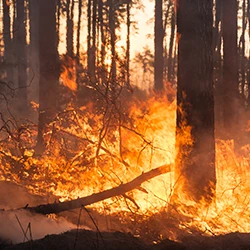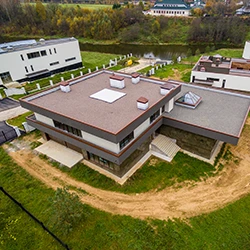California wildfires have been an increasingly devastating force in recent years, causing widespread destruction and loss of life.
While these natural disasters can never be entirely prevented, understanding California Wildfire Laws is crucial for homeowners, businesses, and communities to minimize the impact and prevent further devastation.
As an experienced attorney in California wildfire cases, I've gathered essential information to help you understand these laws. This article will cover key provisions, state prevention measures, and advice for homeowners and wildfire victims.
Quick Summary
- California Wildfire Laws provide comprehensive regulations governing land use, fuel management, fire prevention, and suppression.
- California uses multiple strategies to reduce wildfire risk, including defensible space requirements, evacuation protocols, and wildfire liability laws.
- Wildfires can cause financial hardships, including higher insurance costs and broader economic effects for homeowners and communities.
What Are The California Wildfire Laws?

Provisions of California Wildfire Laws
California Wildfire Laws encompass a range of provisions covering fire prevention and control, liability for negligence, building codes, emergency response coordination, insurance requirements, environmental protection, and assistance for wildfire victims.These provisions collectively address various aspects of California wildfire management, mitigation, and recovery.
Land Use and Development
California Wildfire Laws' land use and development regulations emphasize building codes and zoning requirements to reduce wildfire risks. Fire hazard severity zones have been established based on fuel loading, fire weather, and slope factors.
Fuel Management

- Adhering to building and fire codes, such as constructing homes with fire-resistant materials
- Maintaining a defensible space of 100ft
- Collaborating with neighbors to reduce risk
Fire Prevention and Suppression
Effective fire prevention and suppression measures are crucial in mitigating the impact of wildfires. Public education, enforcement of applicable fire safety regulations, and interagency cooperation are employed to ensure that 98% of wildfires in California are prevented from becoming large or damaging.
Emergency Preparedness

- Mapping areas of significant fire hazards
- Requiring approved fire safety and evacuation plans for certain occupancies
- Coordinating efforts across federal agencies for wildfire prevention and management
An evacuation plan is crucial to reducing the risk of confusion and potential injuries during a wildfire.
How Does California Prevent Wildfires?
California prevents wildfires by implementing a variety of measures to prevent wildfires, including defensible space requirements, evacuation protocols, and wildfire liability laws, such as inverse condemnation.
Defensible Space Requirements

Evacuation Protocols
Evacuation protocols play a vital role in the safety of California residents during wildfires. California law allows officers to restrict access to areas where public health or safety is at risk due to a calamity.These causes of disaster can include:
- Flood
- Storm
- Fire
- Earthquake
- Explosion
Unlawful entry into such areas is considered a misdemeanor under California Penal Code Section 409.5 [3].
Wildfire Liability and Inverse Condemnation
Wildfire liability laws hold parties accountable for accidents that could have been avoided, such as negligence or recklessness in the maintenance or operation of equipment that could contribute to a wildfire [4].Inverse condemnation is a legal doctrine that enables a property owner to request remuneration for any damage to or diminution in their property's value without demonstrating fault.
Insurance and Financial Implications of Wildfires

Wildfire Damage Insurance Laws
Wildfire damage insurance laws ensure that policyholders receive adequate compensation for their losses. Before the introduction of California Assembly Bill 188, homeowners who incurred fire damage were eligible for compensation.This was in the form of the actual cash value of their homes, which is equivalent to the current market value before the incident.
"California's wildfire laws are not perfect, but they are a good start. We need to continue to improve them and make sure that they are enforced effectively. We also need to invest in fire prevention and suppression, and in helping communities recover from wildfires."
- Gavin Newsom, Governor of California
What Should You Do If You Are A Wildfire Victim?

:
- Fire Pot & Gel Fuel Lawsuit
- Aqueous Film Forming Foam Lawsuit
- Kidde Fire Extinguisher Recall
See all related personal injury and accident lawsuits our attorneys covered so far.
FAQs
1. Are There Specific Penalties for Violating California’s Wildfire Safety Regulations?
Yes, penalties for violating California's wildfire safety regulations can include fines, legal actions, and mandatory corrective measures, depending on the severity of the violation and its impact.
2. What Is The New Defensible Space Law In California?
The new defensible space law in California, Assembly Bill 3074, mandates the Board of Forestry and Fire Protection to establish an additional zone for defensible space to enhance fire safety and prevention measures. This law emphasizes the importance of maintaining a 100ft buffer zone around structures using fire-resistant materials.
3. What Is The Regulation 2644.9 In California?
Regulation 2644.9 in California is a regulation that was adopted in 2022 that requires insurers to consider wildfire risk when setting rates for homeowners insurance. The regulation was adopted in response to the increasing number and severity of wildfires in California.
Get in Touch With Our Wildfire Attorneys Today
Suppose you are a wildfire victim seeking legal assistance. In that case, our highly experienced wildfire attorneys at Schmidt & Clark, LLP are ready to assist if you've been affected by a wildfire or have queries about California Wildfire Laws. Our attorneys provide expert legal assistance and guidance to ensure your rights are protected and you receive the compensation you deserve.Contact our wildfire attorneys at Schmidt & Clark, LLP to receive the legal support and guidance you need in navigating the complexities of California Wildfire Laws.
References:
- https://www.cpuc.ca.gov/industries-and-topics/wildfires
- https://www.readyforwildfire.org/more/fire-safety-laws/#:~:text=California%20law%20requires%20that%20homeowners,while%20they%20defend%20your%20home.
- https://www.simmrinlawgroup.com/california-penal-code-section-409-5-c/#:~:text=Individuals%20can%20face%20misdemeanor%20charges,Time%3A%20Up%20to%20Six%20Months
- https://www.nifc.gov/fire-information/fire-prevention-education-mitigation/wildfire-investigation

 Published by
Published by